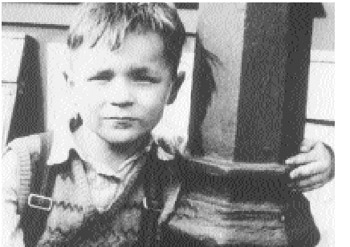![[Metroactive Movies]](/gifs/movies468.gif)
[ Movies Index | Show Times | Santa Cruz | Metroactive Central | Archives ]
Muted
Stephen Frears' 'Liam' shows a weakness for the hard-used British working class
By Richard von Busack
AT THE RISK of seeming like an idiot, I'll confess fondness for the British working-class drama that goes beyond the better-known pleasures: the crisp theatrical discipline of the actors, the fragrant slang, the reminder of how bad other people have it (seeing other people eat cold porridge is supposed to make our own popcorn taste better).
Here's where I'll really sound like an imbecile: the circumscribed lives look attractively simple compared to chaotic life in the United States. The dole may be disgusting, but a man is allowed to fall much harder and much lower in the United States. In the movies, the stability of polite, brown-brick, tea-drinking life comes across as quite appealing; the scarcity and dullness of it are usually obscured.
Moreover, these films always address class struggle, an issue from which American movies back off in terror.
Stephen Frears' Liam follows the woes of a working family in Liverpool in-between the Great War and the Good War. The film begins skating around a family preparing for a New Year's Eve that starts at a pub, then proceeds back home for a private party.
The father of this family is an unsteady figure. Dad (Ian Hart) works at the shipyards. About 10 minutes into Liam, the shipyards close because of the bad economy. As Dad stands by the gates, Mr. Samuels (David Knopov), the Jewish owner of the shipworks, stops the car to stare down the newly unemployed men.
The focus changes to the smallest and quietest member of the family, 7-year-old Liam (Anthony Borrows), who is hobbled with a stutter. His First Communion is coming up, and he's being trained for the Catholic faith. Meanwhile, his sister, Teresa (Megan Burns), goes into domestic service for the Samuels family.
Soon the film shows us the pincers that constrain the family. Dad, who feels exploited, is swayed by the Black Shirts: the English fascists. Meanwhile the church alternately preys on and poisons his family, and the motif of fire and brimstone leads to a climax that's pure Dickens.
Jimmy McGovern, who wrote the film Priest, based Liam loosely on Joseph McKeown's book The Back Crack Boy. One should never dismiss any story of poor people as impossibly tragic, but Liam's point depends on a character standing in exactly the right spot for catastrophe.
This dramatic engineering made me think not so much of Dickens but of Mark Twain's example of how a man, rather than a dog, has a better chance of being hit with a load of bricks. To be hit by a falling load of bricks has to be the result of divine providence, he argued, and you can't trust a dog to carry out divine providence. Besides, the dog would see the bricks coming, and move.
Liam is best in the softer moments: the boy distracting himself by burying his feet in some gravel; a woman singing "Someone to Watch Over Me" a cappella in a pub. But coming out anti-fascist and anti-Catholic in 2001 isn't much of a risk, and these issues can't heat up a wispy film.
[ Santa Cruz | Metroactive Central | Archives ]
Copyright © Metro Publishing Inc. Maintained by Boulevards New Media.
![]()

Trained for the Faith: Anthony Burrows tries to survive a hellfire education in 'Liam.'
Liam (R; 88 min.), directed by Stephen Frears, written by Jimmy McGovern, photographed by Andrew Dunn and starring Ian Hart and Anthony Borrows, opens Friday at the Nickelodeon in Santa Cruz.
From the October 10-17, 2001 issue of Metro Santa Cruz.